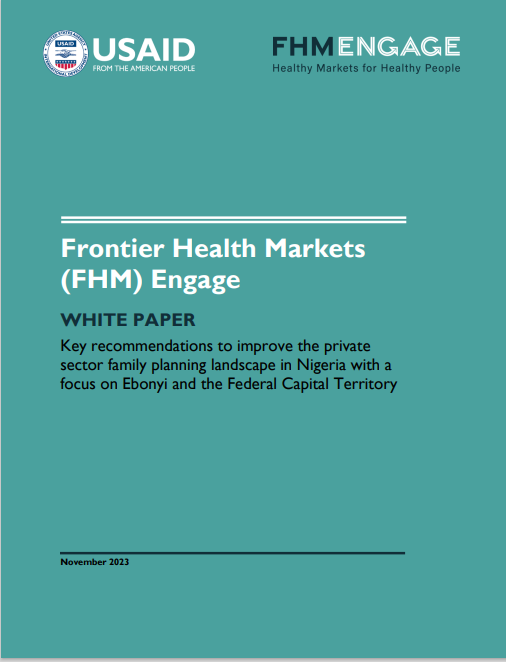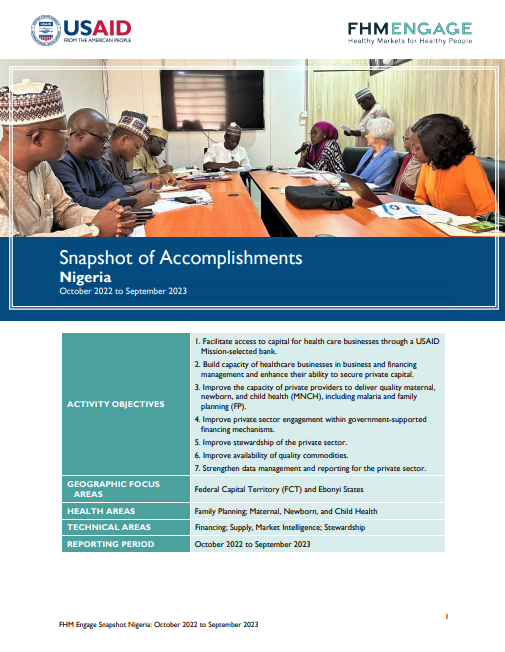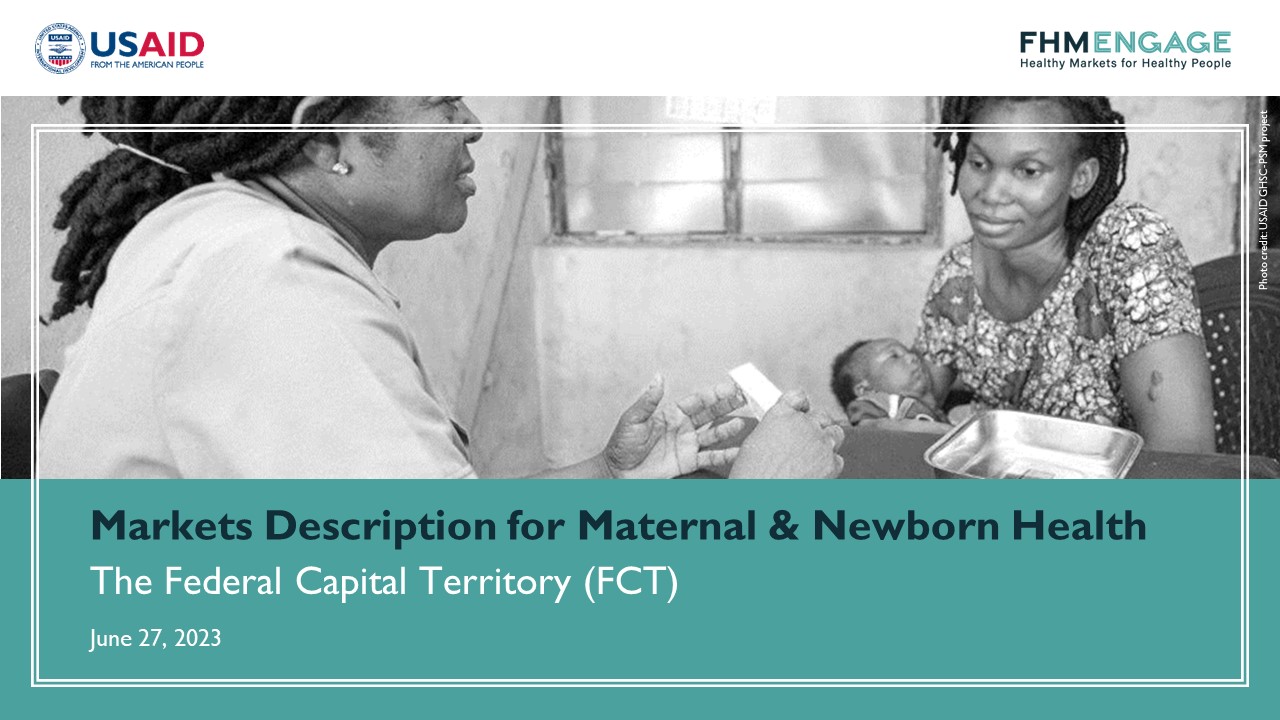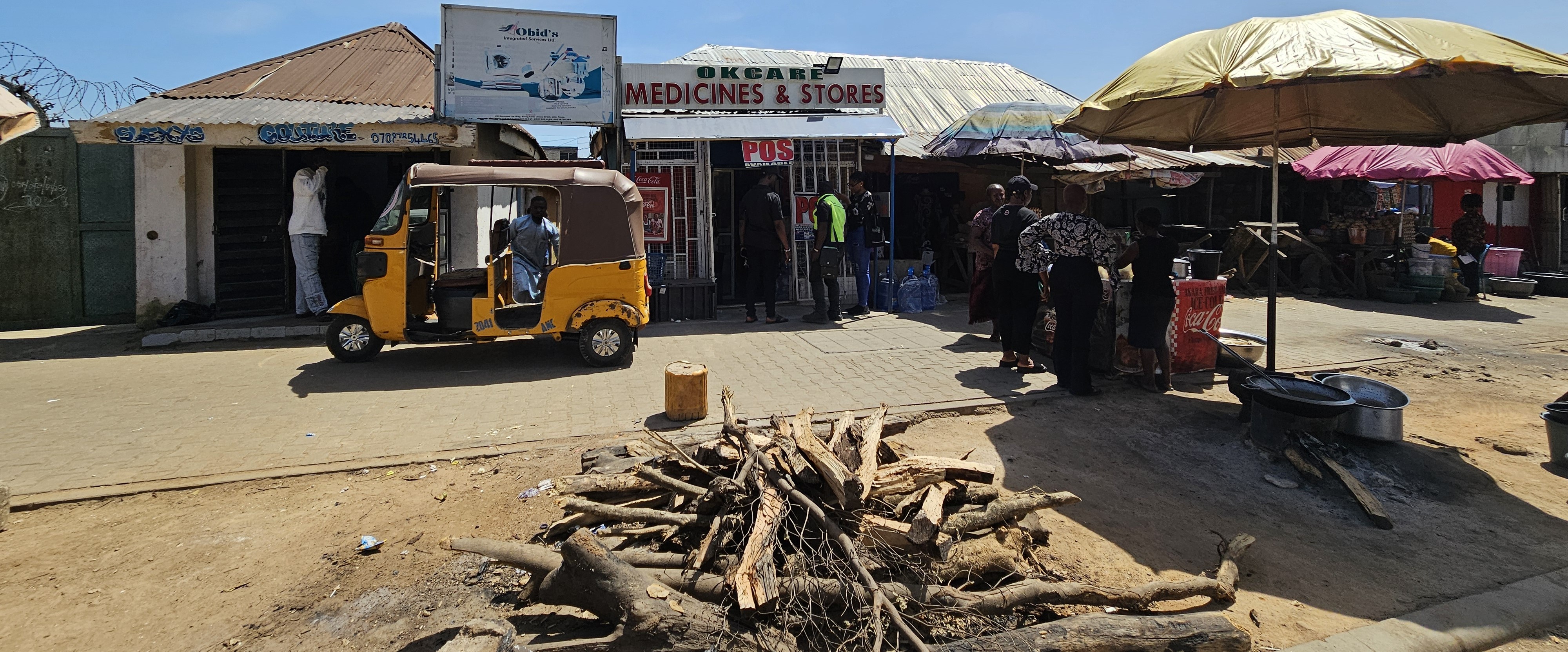
Abuja’s Health Sector Gets a Boost as Local Medicine Store Owner Secures USAID-FCMB Loan
Abuja’s Health Sector Gets a Boost as Local Medicine Store Owner Secures USAID-FCMB Loan
In Kpana, a densely populated slum near Abuja’s Jabi neighborhood, access to healthcare is a persistent challenge. For over two decades, Mr. Clement Okonkwo has served his community by running a small patent medicine store in Kpana, along with two others in nearby suburbs. However, limited stock of family planning products due to funding constraints has often hindered his ability to meet the growing healthcare needs of the area.
This changed in October 2024 when Clement became the first health business owner to secure a loan through a new partnership between USAID and First City Monument Bank (FCMB) in Nigeria. With support from the USAID-funded Frontier Health Markets (FHM) Engage project, Clement participated in financial and business management training, along with a loan clinic held in August. These sessions equipped him with the skills needed to access credit.
The loan will enable Clement to restock his stores in time for the busy holiday season, ensuring the availability of vital reproductive and child health products for his community.
Established in May 2024, the USAID-FCMB partnership is designed to provide up to $10 million in loans to health-focused businesses across Nigeria, strengthening the country’s healthcare delivery systems.
Clement's Perspective
“I am thankful to FHM Engage and Tillit for guiding me in accessing financing from FCMB,” Clement shared. “The loan will help me stock up on crucial reproductive and child healthcare medications, as well as other fast-moving goods, ahead of the Christmas season. The training and follow-up coaching provided by FHM Engage and Tillit have been truly impactful. I now feel confident about approaching other banks for financing to grow my business further.”
Recent Highlights
-
Written by :
-
Published on : 20-Nov-24
- Highlight Type : Stories
- Country :
- Project : FHM Engage
- Language : English
Catalyzing Access to Financing for Healthcare Enterprises in Nigeria
From August 12 to 13, 2024, the FHM Engage activity in Nigeria along with partners, First City Monument Bank, Insight Health Consulting, and Tillit MSME Microservices hosted USAID Nigeria and key local health actors for a co-design workshop to develop suitable loan products for healthcare nano, micro, small, and medium enterprises (NMSMEs) in Nigeria.
The workshop builds on existing works by FHM Engage in Ebonyi and the Federal Capital Territory (FCT), including an access to finance landscape completed in 2023 and a comprehensive access to credit and service readiness assessment completed in June 2024. Utilizing Insights from the two assessments, FHM Engage and local actors during the workshop, co-created ideas and credit solutions that will be suitable for healthcare NSMEs in Nigeria.
The event included 35 diverse participants from USAID Nigeria; government health regulators including the Pharmacy Council of Nigeria, FCT Private Health Establishments Registration and Monitoring Committee; private healthcare providers; health professionals associations including GMD, ACPN, AGPNPN, NAPPMED; innovative health solution providers such as WellaHealth and Organon; and other complementary USAID implementing partners including the Health Workforce Management Activity.
Building on the workshop outcomes, FHM Engage and Tillit MSEME, will facilitate the disbursement of developed healthcare centered loans provided by FCMB and further train the supported healthcare providers in business and financial management to boost their viability and overall efficiency.
Banner image: Participants of a workshop discuss pathways for healthcare providers to access financing in Nigeria. Credit: FHM Engage.
Recent Highlights
-
Written by :
-
Published on : 19-Aug-24
- Highlight Type : News
- Country :
- Project : FHM Engage
- Language : English
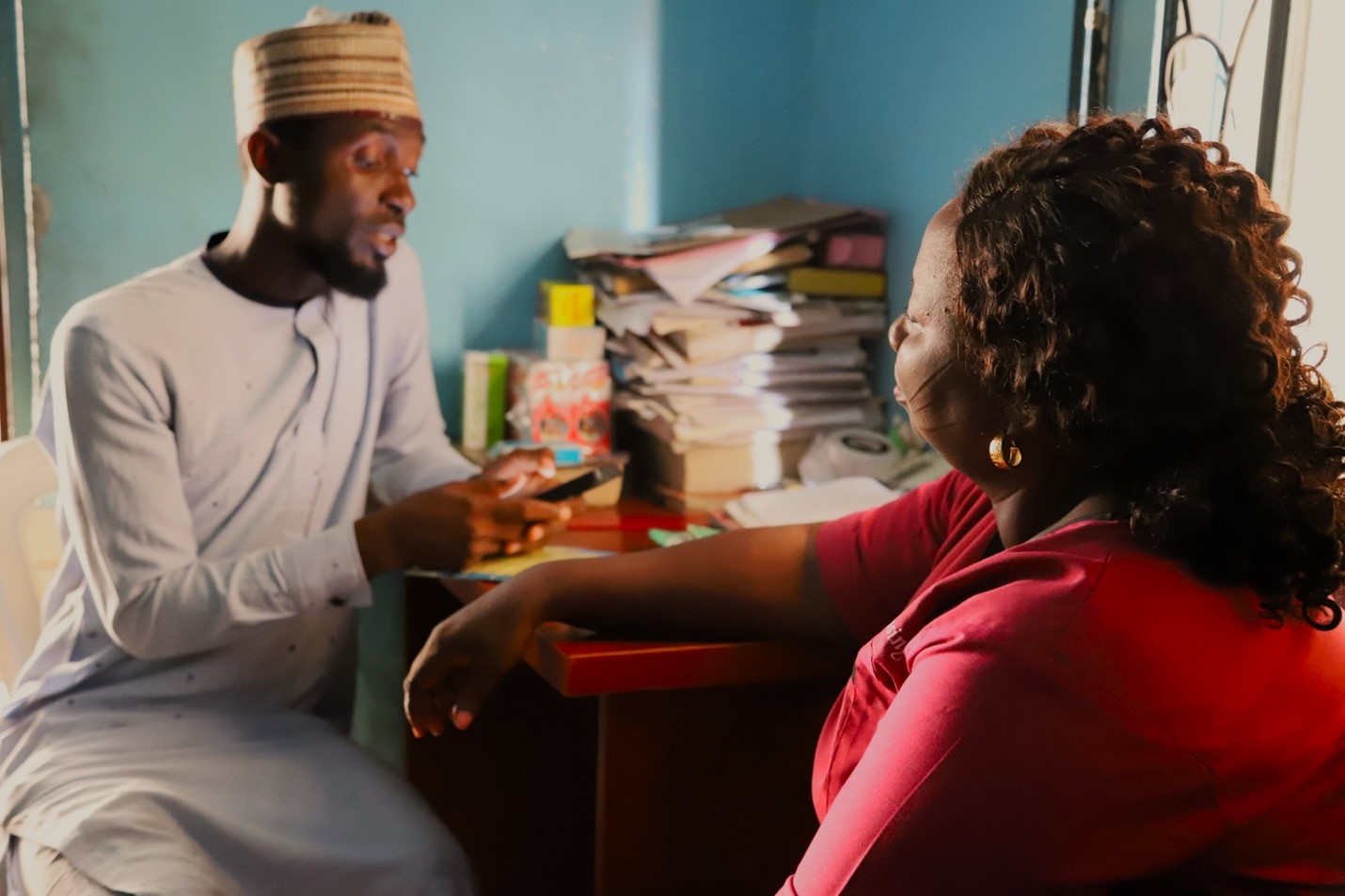
FHM Engage Completes Data Collection for a Health Facilities Assessment in Nigeria
Our FHM Engage team in Nigeria, in partnership with Insight Health Consulting, has successfully completed data collection for a health facility assessment in two states, Ebonyi and the Federal Capital Territory (FCT) Abuja. This assessment, targeting 4,000 private health facilities (covering patient and private medicine vendors, community pharmacies, clinics, and maternity), will pave the way for establishing market access and facilitating business linkages that will drive market systems changes and improve delivery and access to quality maternal, newborn, and child health, as well as family planning services in the target states. Over the coming weeks, the team will finalize the analysis of the gathered data and generate insights from the assessment.
Related Resources:
- Snapshot of Accomplishments: Nigeria (Oct 2022 to March 2023)
- Harnessing the Power of the Market Development Approach and its Prospects for Transforming Healthcare in Nigeria | FHM Engage (healthmarketlinks.org)
- In Nigeria, FHM Engage compiled six market descriptions in the two states of Ebonyi and the Federal Capital Territory (FCT): Ebonyi Child Health; Ebonyi Family Planning; Ebonyi Maternal Newborn Health; FCT Child Health; FCT Family Planning; FCT Maternal Newborn Health
Banner photo: A health care provider speaks with a patient in Nigeria. Photo credit: FHM Engage.
Recent Highlights
-
Written by :
-
Published on : 09-Jul-24
- Highlight Type : News
- Country :
- Project : FHM Engage
- Language : English

Harnessing the Power of the Market Development Approach and its Prospects for Transforming Healthcare in Nigeria
USAID’s Frontier Health Markets (FHM) Engage is using the market development approach (MDA) in Nigeria to analyze the health market. To address market failures, FHM Engage seeks to create an enabling environment that fosters collaboration between public and private health actors, to then improve the market environment and increase equitable access to and uptake of health products and services.
Today, Nigeria's healthcare system is overwhelmed by a slew of challenges – lack of resources, lack of financing, insufficient data – which continue to hinder progress toward achieving optimal health outcomes for its population, particularly vulnerable groups like children and women within low-income households. More specifically, access to modern and reliable family planning (FP) products and services is limited, leading to high fertility rates and overstretched health facilities. Child health (CH) outcomes are poor due to inadequate immunization coverage, malnutrition, and limited access to essential health products and services especially in rural areas. Also, maternal newborn health (MNH) is strained by factors such as limited access to skilled birth attendants, high maternal mortality rates, inadequate emergency obstetric care, and cultural practices that may hinder safe deliveries. These challenges collectively contribute to complexities within the healthcare system, necessitating comprehensive health market interventions to address them.
The MDA offers a holistic and effective strategy to transform the healthcare landscape by developing uniquely suited solutions to tackle health market challenges. It focuses on creating sustainable solutions by engaging with key stakeholders, including the private sector, to drive innovation, improve service delivery, and promote the affordability and accessibility of healthcare products and services. By leveraging market-based strategies to stimulate demand and supply, the MDA can help improve access to essential FP, CH, and MNH products and services. Based on this, FHM Engage embarked on implementing the MDA in two states, Ebonyi and the Federal Capital Territory (FCT) Abuja.
Ebonyi, located in the southeastern part of Nigeria, has been grappling with low modern contraceptive prevalence rate (mCPR) and high maternal and neonatal mortality rates. The mCPR in Ebonyi stands below the national average, indicating a critical need for enhanced FP. Furthermore, maternal and neonatal mortality rates in the state are alarmingly high, highlighting the urgency of improving access to quality maternal and newborn products and services.
Painting a different picture, the FCT Abuja, as the capital of Nigeria, serves as a hub for diverse populations with varying health needs. While the FCT Abuja boasts relatively better health indices compared to many other regions in Nigeria, there are still pockets of sprawling underserved communities (slums) facing challenges in accessing quality FP, CH, and MNH support.
In Nigeria, FHM Engage is using the MDA by focusing and leveraging the strengths of the private healthcare sector (private clinics/hospitals, community pharmacies and patent and proprietary medicine vendors), to improve the delivery, accessibility, and affordability of crucial healthcare services. As the project progresses into the implementation phase of its interventions, we reflect on some of the insights gleaned from the completed diagnosis and design processes of the MDA, namely the value of:
- Comprehensive market analysis
- Engagement of local actors
- Data-driven decision-making
- Putting users/consumers first
- Monitoring and adaptation
Comprehensive Market Analysis: Identifying Constraints and Opportunities
As a first step of the MDA, FHM Engage conducted a market diagnosis (see Figure 1). Recognizing the importance of local contextual knowledge, the project partnered with Solina Group to develop a comprehensive understanding of market constraints, highlighting the challenges faced by private healthcare providers. Through the market diagnosis, FHM Engage identified several issues responsible for the failure or underperformance of FP, CH, and MNH markets in Ebonyi and FCT Abuja. These included economic barriers, limited access to finance for improving infrastructure, equipment and services, weak referral systems, and inadequate data reporting. Additionally, regulatory issues, such as unsupportive licensing requirements and lack of compliance with standards, remain barriers to the effective functioning of private healthcare facilities.
Figure 1: FHM Engage’s Market Development Approach (MDA) framework
Engaging Local Actors: Collaborating for Sustainable Solutions
The MDA places great emphasis on empowering local actors to collaboratively design and deliver solutions and interventions that may improve the performance of health markets. This is because local actors may possess valuable insight into the specific challenges and dynamics of health markets in Nigeria and have a deeper understanding of potential cultural, social, economic, and political factors that may influence access and utilization of health products and services.
Understanding this, while using the MDA in Nigeria, FHM Engage has consistently consulted and involved local actors, including private healthcare providers, professional associations, regulatory bodies, government policy makers, and development partners. This collaboration has ensured that interventions are locally relevant and aligned with the needs of the target population. This approach to implementation fosters an environment where all actors actively contribute to the development and improvement of the health market systems. Additionally, involving local market actors in co-creating interventions, builds a sense of ownership and responsibility towards the initiatives. This ownership leads to greater commitment and long-term sustainability beyond the lifespan of the project.
Data-driven Decision-making: Leveraging Insights for Action
MDA processes rely on robust data collection and analysis to inform decision-making. By collecting data on market trends, consumer preferences, and healthcare utilization patterns, stakeholders gain a comprehensive understanding of existing gaps and opportunities. These insights guide the design of appropriate interventions that are evidence-based, cost-effective, and tailored to local needs.
Taking insights from the market diagnosis into account, FHM Engage then advanced to the design phase in Nigeria and conducted consultations and validation meetings with national and subnational stakeholders and development partners to validate diagnostic findings. This was followed by a co-creation phase which led to the development of priority interventions that are specific for both Ebonyi and the FCT Abuja and aim to improve the performance of the FP, CH, and MNH markets in the two states.
Putting Users/Consumers First
One of the significant advantages of market systems development is its potential to benefit underserved populations, particularly low-income individuals. Through firsthand experiences shared by local actors, FHM Engage gained an understanding of the needs and preferences of the local population and worked to ensure that interventions were designed with the end-users in mind. For instance, a main issue for consumers is affordability of health products and services, and thus FHM Engage is focusing on addressing the financial barriers that hinder access to quality health products and services in Nigeria. The focus on users/consumers will contribute to increased acceptability, adoption, and impact.
Monitoring and Adaptation: Ensuring Sustainable Impact
The MDA processes identifies and incorporates a robust monitoring and evaluation framework to track the progress and impact of interventions. Regular monitoring allows stakeholders to identify and address implementation challenges promptly, ensuring the interventions remain effective and sustainable. This adaptive approach empowers actors to make necessary adjustments and maximize the impact of interventions to strengthen health systems and address healthcare challenges effectively.
As Nigeria continues to address healthcare challenges, the MDA serves as a guiding framework to develop innovative and locally relevant solutions to improve access to and quality of health products and services for all. By understanding market constraints, engaging local actors, leveraging data-driven insights, adopting human-centered design, and prioritizing monitoring and adaptation, FHM Engage’s use of the MDA is working to unlock the private sector's potential, improve access to quality FP, CH and MNH products and services – in particular for underserved populations in targeted states – and build a resilient health system for Nigeria.
Related Resources:
- Snapshot of Accomplishments: Nigeria (Oct 2022 to March 2023)
- In Nigeria, FHM Engage compiled six market descriptions in the two states of Ebonyi and the Federal Capital Territory (FCT): Ebonyi Child Health; Ebonyi Family Planning; Ebonyi Maternal Newborn Health; FCT Child Health; FCT Family Planning; FCT Maternal Newborn Health
MDA Overview Briefs:
- What is the Market Development Approach (MDA) Process for Family Planning, and Maternal, Newborn, and Child Health? Brief #1 of 4 in a series on the MDA
- What is the Market System Framework and Its Role in Developing Family Planning, and Maternal, Newborn, and Child Health Markets? Brief #2 of 4 in a series on the MDA
- What are Key Terms Used in a Market Development Approach for Health? Brief #3 of 4 in a series on the MDA
- The Meaning and Importance of Stewardship in Developing Family Planning, and Maternal, Newborn, and Child Health Markets. Brief #4 of 4 in a series on the MDA
MDA Course Curriculum:
- Market Development Approach (MDA) 2023 course curriculum
- Course brief #1: What is the market development approach process for family planning, and maternal, newborn, and child health?
- Course brief #2: What is the market system framework and its role in developing family planning, and maternal, newborn, and child health markets
- Course brief #3What are key terms used in a market development approach for health?
- Course brief #4:The meaning and importance of stewardship indeveloping family planning,andmaternal,newborn, and child health markets
Banner photo: A health care provider speaks with a patient in Nigeria. Photo credit: USAID flickr.
Recent Highlights
-
Written by :
-
Published on : 09-Jul-24
- Highlight Type : Blog
- Country :
- Project : FHM Engage
- Language : English

Resource Library
WHITE PAPER: KEY RECOMMENDATIONS TO IMPROVE THE PRIVATE SECTOR FAMILY PLANNING LANDSCAPE IN NIGERIA WITH A FOCUS ON EBONYI AND THE FEDERAL CAPITAL TERRITORY
Resource Type : Report
Country : Nigeria
Year : 2023-12-29T10:12:27
Language : English
Project : FHM Engage
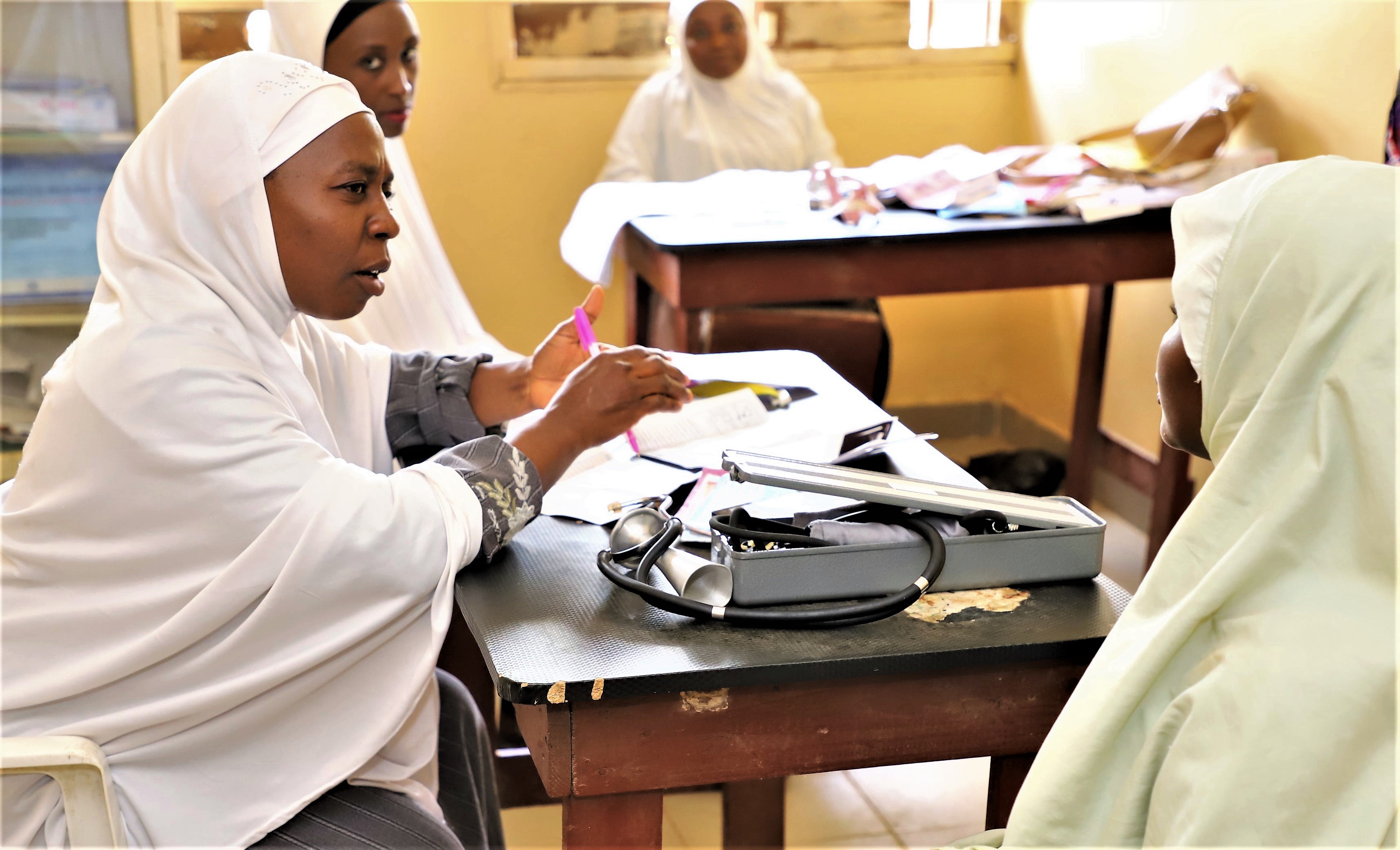
FHM Engage Conducted Market Descriptions in India, Kenya, Liberia, Madagascar, Nepal, Nigeria, Pakistan
FHM Engage uses a market development approach (MDA) to understand a country’s health market system. The MDA allows us to diagnose root causes of market under-performance, such as restricted supply of and consumer demand for health products and services. FHM Engage supports local public and private market actors to design locally informed strategies and solutions that improve market systems, including core functions of supply and demand and supporting functions that strengthen the enabling environment for market growth.
As a critical foundational step to the MDA, FHM Engage compiled detailed market descriptions in India, Kenya, Liberia, Madagascar, Nepal, Nigeria, Pakistan. Review them here:
INDIA
FHM Engage India Market Description 2023
FHM Engage India Market Description 2023 (Abridged)
Health Market Description Brief on Family Planning in India
KENYA
FHM Engage Kenya Market Description 2023
LIBERIA
FHM Engage Liberia Market Description 2023
FHM Engage Liberia Market Description 2023 (Abridged)
MADAGASCAR
In Madagascar, we completed three market descriptions: Family Planning; Maternal & Child Health; Nutrition
NEPAL
FHM Engage Nepal Market Descriptions 2023
NIGERIA
In Nigeria, we compiled six market descriptions in the two states of Ebonyi and the Federal Capital Territory (FCT): Ebonyi Child Health; Ebonyi Family Planning; Ebonyi Maternal Newborn Health; FCT Child Health; FCT Family Planning; FCT Maternal Newborn Health
PAKISTAN
FHM Engage Pakistan Market Description 2023
Related Resources:
‘How-to’ Guidance: Executing the Diagnosis Phase of a Market Development Approach
MDA Overview Briefs:
MDA Course Curriculum:
Market Development Approach (MDA) 2023 course curriculum
Course brief #3 What are key terms used in a market development approach for health?
Recent Highlights
-
Written by :
-
Published on : 03-Apr-24
- Highlight Type : News
- Country : , , , , ,
- Project : FHM Engage
- Language : English

Resource Library
Snapshot of Accomplishments: Nigeria (Oct 2022 to Sept 2023)
Resource Type : Brief
Country : Nigeria
Year : 2024-03-01T13:59:31
Language : English
Project : FHM Engage

Resource Library
Nigeria FCT MNH Market Description 2023
Resource Type : Presentation
Country : Nigeria
Year :
Language : English
Project : FHM Engage

Resource Library
Nigeria FCT FP Market Description 2023
Resource Type : Presentation
Country : Nigeria
Year :
Language : English
Project : FHM Engage

Resource Library
Nigeria FCT CH Market Description 2023
Resource Type : Presentation
Country : Nigeria
Year :
Language : English
Project : FHM Engage
Pagination
- Page 1
- Next page


